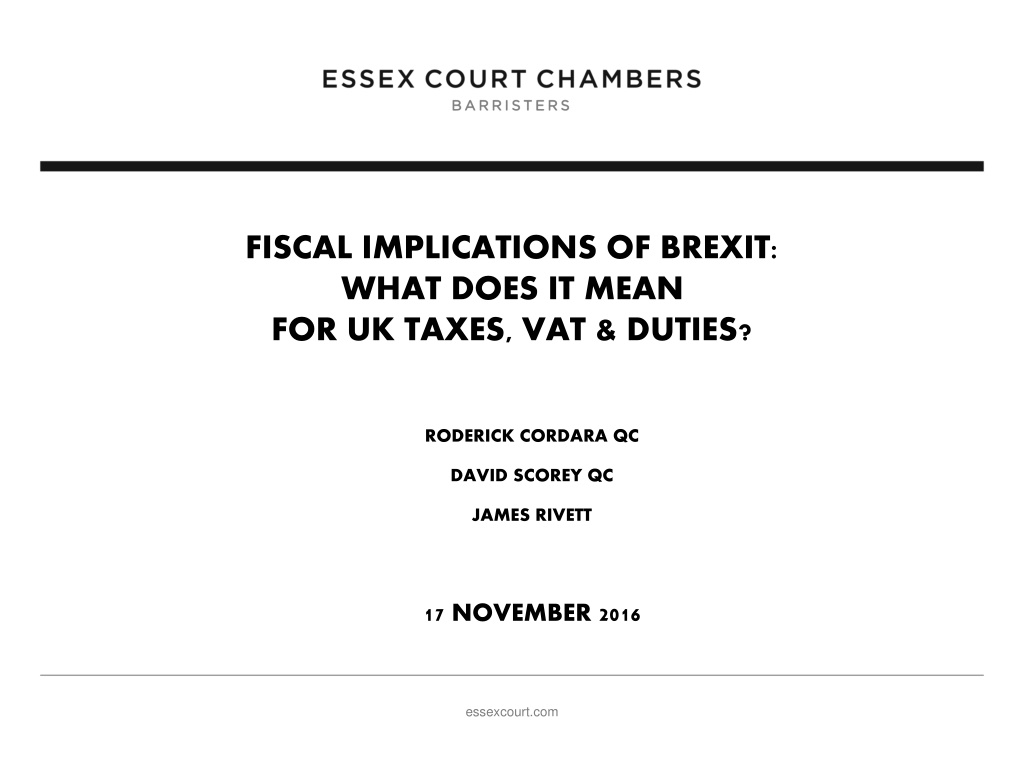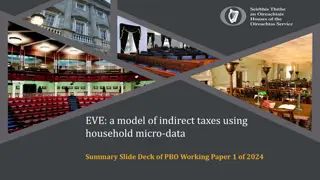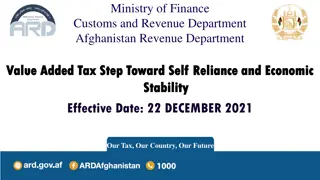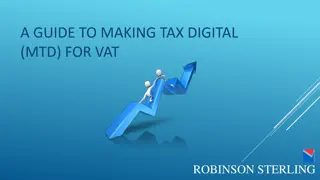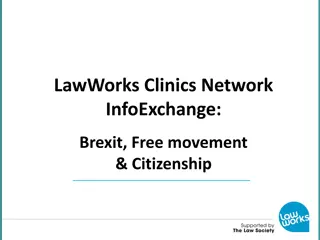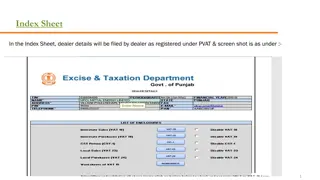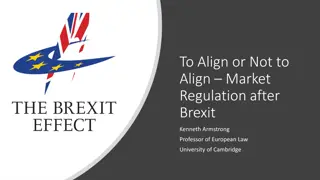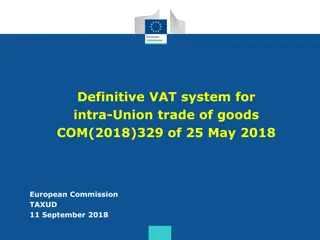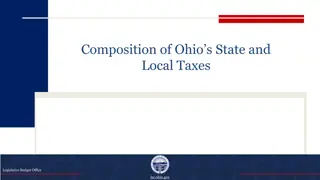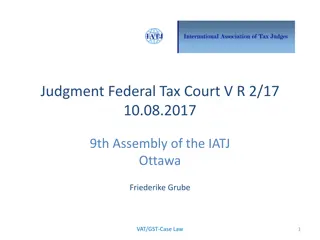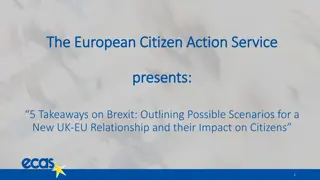The Impact of Brexit on UK Taxes, VAT, and Duties
Explore the fiscal implications of Brexit on UK tax policies, VAT regulations, and duties. Understand the historical treaties and statutes that led to the current state. Learn how EU membership affected UK sovereignty in taxation and the unique role of the European Communities Act in shaping UK law related to the EU.
Download Presentation

Please find below an Image/Link to download the presentation.
The content on the website is provided AS IS for your information and personal use only. It may not be sold, licensed, or shared on other websites without obtaining consent from the author.If you encounter any issues during the download, it is possible that the publisher has removed the file from their server.
You are allowed to download the files provided on this website for personal or commercial use, subject to the condition that they are used lawfully. All files are the property of their respective owners.
The content on the website is provided AS IS for your information and personal use only. It may not be sold, licensed, or shared on other websites without obtaining consent from the author.
E N D
Presentation Transcript
FISCAL IMPLICATIONS OF BREXIT: WHAT DOES IT MEAN FOR UK TAXES, VAT & DUTIES? RODERICK CORDARA QC DAVID SCOREY QC JAMES RIVETT 17 NOVEMBER 2016 essexcourt.com Roderick Cordara QC essexcourt.com
SOVEREIGNS, SOVEREIGNTY, & TAXES Raising taxes is expression of sovereignty 1972-2016 UK as International Treaty obligations with Member States of the EU, which affected tax (inter alia) Nothing new there: Sovereigns always doing deals with each other on tax a sovereign power agreed Eg double tax treaties, GATT, bilateral investment treaties, Free trade agreements Roderick Cordara QC essexcourt.com
HOW DID WE GET HERE? TREATIES + STATUTES A treaty tour of Europe: Paris (1951) Coal & Steel. Rome (1957) EEC . Luxembourg (1987) Single European Act . Maastricht (1992) TEU EC & EU . Amsterdam (1997) adjustments to TEU. Nice (2001) 10 extra join. Constitutional Treaty proposed & died (2005). Lisbon (2007) TFEU EU . Roderick Cordara QC essexcourt.com
WHERE WE ARE NOW: KEY TREATIES Rome Treaty (1957) Maastricht (1992) Treaty on the European Union EC , and EU - closer union - monetary union subsidiarity - EU citizenship - consumer-protection, public health, culture. Amsterdam (1997) anti-discrimination - immigration & asylum Lisbon (2007) Treaty on the Functioning of the EU EU supersedes EC . Roderick Cordara QC essexcourt.com
THE INCOMING TIDE UK Accession Treaty (1972). European Communities Act 1972 ( EC Act ). International law obligations enacted into domestic law EC Act 1972. Unprecedented step to allow international law to flow into daily legal life Lord Denning s famous comment the inflowing tide of EU law. EC Act 1972 is the gateway to EU law tide. Roderick Cordara QC essexcourt.com
WHY EU IS DIFFERENT: EC ACT IS THE KEY Though based on International Treaties, EU membership has one extra ingredient. EU treaties affect daily UK life and business because Parliament, as a sovereign European Communities Act 1972 EC Act is key : it puts citizens into direct touch with EU law & institutions. See Gina Miller & Another v The Secretary of State for Exiting the European Union [2016] EWHC 2768 (Admin) Parliament has delegated powers to EU in the areas covered by the EC Act. A side effect is that taxpayers can challenge legality of Parliamentary statutes. body, passed the Roderick Cordara QC essexcourt.com
TYPES OF EU LAW MAKING WHICH WOULD VANISH What Sovereigns give, they can take back: Treaties: international obligations Regulations automatically the domestic law of all Member States. Directives not auto-law, but need to be enacted, but give certain rights which can be used against States, even if not enacted. Taxpayers benefit. Decisions bind the party aimed at. Legal principles of EU law ECJ case law plus Recommendations & Opinions non-binding. Roderick Cordara QC essexcourt.com
FOCUS ON THE EUROPEAN COURT OF JUSTICE ECJ answers questions from national courts on the meaning of EU laws. Binding, no appeal. British Judges are/were EU law judges too. Marleasing doctrine from ECJ 1990: Courts to interpret UK laws as far as possible in EU sense. Embraced in UK: e.g. IDT Card services Ct Appeal 2006. Directly effective rights against the Government and statute eg non-discrimination, effectiveness, legitimate expectation, restitution, freedom of establishment: good for taxpayers. Would go. all Roderick Cordara QC essexcourt.com
HIGH LEVEL BACKGROUND: DEPARTURE LOUNGE Time scale for changes : see TEU Art 50(1). 1. Any Member State may decide to withdraw from the Union in accordance with its own constitutional requirements. Roderick Cordara QC essexcourt.com
BREAKING UP PROCESS 2. A Member State which decides to withdraw shall notify the European Council of its intention. In the light of the guidelines provided by the European Council, the Union shall negotiate and conclude an agreement with that State, setting out the arrangements for its withdrawal, taking account of the framework for its future relationship the Union. That agreement shall be concluded by the Council, after obtaining the consent of the European Parliament. with Roderick Cordara QC essexcourt.com
2 YEAR COUNTDOWN FROM NOTICE 3. The Treaties shall cease to apply to the State in question from the date of entry into force of the withdrawal agreement or, failing that, two years after the notification referred to in paragraph 2, unless the European Council, in agreement with the Member State concerned, unanimously decides to extend this period. - 2 years from Notice to sort it all out a bumpy ride and an untidy finish quite possible Roderick Cordara QC essexcourt.com
WHAT GOES AUTOMATICALLY: INTERNATIONAL LEVEL EU citizenship. Membership of the single market via EU Rights of free movement and work in EU. Free movement of capital rules. State aid and competition rules via EU Supremacy of EU laws but maybe not the laws themselves as far as legislated in UK and left in place Ability to seek infraction by Brussels where directly effective rights of UK traders/taxpayers infringed. Enjoyment/protection under EU treaties between EU and rest of world. Obligation to pay membership fees/ and to hand over customs duties. Right to receive payments and subsidies from EU Roderick Cordara QC essexcourt.com
DISMANTLING UK EU LAW & TAX ALL CHANGE? NOT YET BREXIT will require repeal of EC Act s future application of EU law to UK citizens. But it seems the past 40 years of law making will not come under immediate scrutiny: Secretary of State for Exiting the European Union David Davis has announced plans to repeal the ECA s prospective effect. The introduction of a new Bill to repeal it will mean the Act ceases to apply from the day of exit forward. BUT at the same time the new Bill will convert existing EU law into domestic law. https://www.gov.uk/government/news/government- announces-end-of-european-communities-act Roderick Cordara QC essexcourt.com
EUROPEAN COMMUNITIES (REPEAL) ACT 2017 ? Future EU rights and obligations to lapse automatically on UK exit, save as saved. Rolling retrospective programme to replace selected EU laws (eg EU Regulations (directly effective) rules or rules transposed into UK statute)? Statutory Instruments to be used eg Henry VIII clause - a multi-year programme? Repeal of direct charge of Consolidated Fund for EU contributions in ECA s 2(3). Roderick Cordara QC essexcourt.com
EU LAW = UK LAW = ? Parliament will be free amend, repeal or improve any law after appropriate scrutiny and debate. In theory, includes tax laws eg VAT But how much would really go? How soon? Prospective only or including past rights (not yet enforced)? On-going cases status? Future decisions of ECJ status? Roderick Cordara QC essexcourt.com
WHAT GOES: TAX-RELATED INTERNATIONAL OBLIGATIONS Obligation to have a VAT system Obligation not to have other VAT style taxes Obligations re: Customs Duties we keep the duties we collect (but UK no longer gateway to EU free circulation) Obligations re excise duties Applicability of EU legal principles to tax: eg non-discrimination in cross-border tax situations & abuse of right in VAT Roderick Cordara QC essexcourt.com
WHAT GOES THE ECJ JURISDICTION & CASE LAW No further effect of EU judgments or institutional acts, after exit. Unfinished ECJ references on UK issues will lapse: ECJ s jurisdiction ends absolutely at midnight on ??? 2019. Status of accrued rights or accrued liabilities based on EU law for the past probably sound But how far into the future? Roderick Cordara QC essexcourt.com
VAT A TAX WITH ATTITUDE Common theme in: The First VAT Directive Second VAT Directive Sixth VAT Directive Principal VAT Directive is that VAT is an instrument of economic integration. Only turnover tax allowed to Member States Roderick Cordara QC essexcourt.com
EU VAT POLICY AGENDA A THING OF THE PAST? EU VAT was not just money raising tax Was a consumption tax designed to shape the market An instrument against anti-competitive behaviour Single market: economic integration Uniform turnover tax to create single market Free flows of people, goods, services, capital Same fiscal outcomes from Lisbon to Latvia Brexit means failure of aims of VAT in UK (EU?) Roderick Cordara QC essexcourt.com
THE PURPOSIVE APPROACH LIVES ON, BUT FOR WHAT PURPOSE? All tax statutes now purposively interpreted anyway But what is the purpose of VAT post-Brexit? Just to raise cash UK is a single market already Meaning of UK tax statutes will not be altered retrospectively by departure alone. Past decisions would have to be reversed by legislation HMRC s chance for revenge? Back to purchase tax mind set? (Who will admit to remembering purchase tax? Roderick Cordara QC essexcourt.com
FUTURE AN AUSTRALIAN STYLE APPROACH Goods & Services Tax in Australia based on EU model Without EU VAT integration agenda A common law turnover tax No concept of consumption or non-discrimination Just read the words on the page as common sense business tax Can lead to weird outcomes eg just making an agreement is a supply (Qantas v Commr.) Not 8thbut 13thDirective claims for EU VAT in future VAT back at Gare du Nord, St Pancras Double taxation of cross-border supplies an issue Roderick Cordara QC essexcourt.com
CASES THAT WOULD HAVE BEEN DIFFERENT WITHOUT EU Almost any ECJ VAT case - eg EU v UK (all infraction cases) Card Protection Plan - single multiple supplies Marks & Spencers - retrospective, non-discrimination FII Test case - restitution Halifax - abuse Sempra Metals - compound interest UK EU-law influenced cases Fleming - retrospective legislation IDT anti-avoidance Pendragon - abuse Roderick Cordara QC essexcourt.com
PARLIAMENT SUPREME = HMRC SUPREME ? Retrospective tax legislation (consider approaches in Huitson [2010] EWCA Civ 892 and Shiner [2010] EWCA Civ 558) Pick and choose tax rules, that do not have a unifying principle no discrimination principle No proportionality restraint in legislation No legitimate expectation defence to Acts Freer hand in Administrative law challenges Can amend the GAAR to include VAT Can introduce intention-based GAAR into VAT (Cadbury- Schweppes can be ignored) Restitution burden of proof can be reversed, Australian Style (reversing Baines & Ernst ) Roderick Cordara QC essexcourt.com
CUSTOMS DUTIES Application of Community Customs Code 2913/92 and Implementing Regulation 2454/93 in UK: gone Customs duties come home : No need to send the proceeds of customs duty to Brussels Tariff barriers under UK control UK business faces tariffs in ex-Single Market UK Still part of the WTO: GATT, GATS, TRIPS most favoured nation, national treatment standards Irish border to be fenced? Roderick Cordara QC essexcourt.com
EXCISE DUTIES Excise duties freed from direct EU control Fuel Duty, Alcohol Duty, Tobacco Products Duty No minimum rates, no need for level playing field. No EU procedural requirements. But query if UK wishes to come back into single market Roderick Cordara QC essexcourt.com
DIRECT TAX (CORPORATE) Treatment of Dividends and Parent- Subsidiary Directive Interest and Royalties Controlled Foreign Companies Exit taxes Roderick Cordara QC essexcourt.com
DIRECT TAX (PRIVATE CLIENT) Impact on existing reliefs (e.g. agricultural property relief extension in Chapter 2 Part 5 IHTA 1984 ) Case example: treatment of charities (see C- 318/07 Persche [2009] ECR I-359 and Schedule 6 Finance Act 2010) Anti-avoidance provisions (note in particular infraction proceedings and amendments to Part XIII ITA 2007 and s. 13 TCGA 1992) Roderick Cordara QC essexcourt.com
RESOLUTION OF HISTORIC DIRECT TAX ISSUES Case study: the FII Group Litigation Roderick Cordara QC essexcourt.com
MULTIPLE STATE AID REGIMES UK firms trading in EU will still need to satisfy EU state aid rules EU firms trading into the UK will have to satisfy a UK competition regime on state aid. UK trading with the rest of the world will lose the ability to rely on the EU system, which is an effective and powerful system The UK will have to rely on such protections as can be found in the WTO system, which are not as good. UK will leave a well-tried supranational system, and be left to create its own solutions Roderick Cordara QC essexcourt.com
WTO ANTI-DISCRIMINATION Other supranational rules Most Favoured Nation and National Treatment fair conditions of trade. Rules on dumping (exporting at below cost to gain market share) and subsidies. Other WTO agreements competition: in agriculture, government procurement (a plurilateral agreement extends competition rules to purchases by thousands of government entities in many countries). UK Competition Act 1998 s. 60 states that competition cases within the UK must be dealt with as far as possible in a manner which is consistent with EU law. aim to support fair intellectual property, Roderick Cordara QC essexcourt.com
EU ANTI-AVOIDANCE MOVES STILL BITE Recent EC initiatives against tax avoidance by multi-nationals will still bite on UK firms trading in EU (IP/16/159). Eg proposals to amend the Accounting Directive (Directive 2013/34/EU) to ensure that large groups publish annually a report disclosing the profit and the tax accrued and paid in each Member State on a country-by-country basis. Disclosure for every EU country in which a company is active, plus (so-called tax havens). Aggregate figures will also have to be provided for operations in other tax jurisdictions in the rest of the world. Roderick Cordara QC essexcourt.com
BUT TAX WILL INEVITABLY BE PART OF THE NEW TREATIES What tax deals will UK do in context of its replacement treaty deals? These will impact on UK tax regime going forward. Existing UK bilateral investment treaties with tax provisions Double tax treaties Roderick Cordara QC essexcourt.com
The UKs options Source: Various, Deloitte analysis Looser ties with Europe Economics & Markets Research, Deloitte LLP, London 33
CONCLUSION UK government will have considerable new freedom to tighten the tax net within the UK, unfettered by EU principles of taxpayer protection UK can preserve EU principles which are anti- taxpayer: benefit without the burden. UK taxpayer favourable tax-breaks, still must pass EU State Aid scrutiny Expect high degrees of volatility Maybe a decade before things settle own. Roderick Cordara QC essexcourt.com
